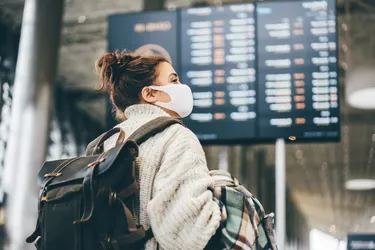
COVID-19 cases are still spiking throughout the U.S., with the COVID Data Tracker reporting high transmission rates. That could be bad news if you were planning to travel during the upcoming 2022-2023 holiday season, and ABC News reports that experts suggest transmission could be once again extremely high in the fall and winter to come. For those who are fully vaccinated and boosted, wearing a high-quality N-95 mask in public places and monitoring cases in the areas you'll be traveling can help you to mitigate your risk if you decide to travel. You should still try to keep up-to-date of any new variants or other potential problems.
COVID and US Travel Destinations
Video of the Day
If you've already chosen your destination and booked your reservations, it's important to be aware of how things are going in your arrival city. You can check the COVID Data Tracker's county view for the latest case numbers. If you use the county view and see, for example, x cases per x in the past x days is fairly high, you might want to take extra precautions when you arrive.
Video of the Day
You may still be open to a destination, though, which gives you some flexibility. Most recently, the northeastern part of the United States was seeing tremendous case counts, but those are falling a bit on the east coast and are increasing elsewhere. In general, however, as of June 2022, there have been an average of over 100,000 new COVID-19 cases a day throughout the country, much higher than during the initial March 2020 alpha variant surge in the United States.
For those leisure vacations, you might still feel uneasy about gathering in large crowds indoors even after being boosted.
Protecting Yourself Before Travel
The CDC emphasizes the importance of vaccination before traveling. Once you arrive at your destination, some venues might even require proof. If it's been six months or longer since you were fully vaccinated, it is also recommended that most people over the age of 5 receive a booster, and some adults, including those over the age of 50 or with certain health conditions, should get a second booster 6 months after their first booster. Check into whether you're among the CDC booster recommendation groups.
Another way to protect yourself is financially. If you're still booking reservations, look into refund policies. Hotels often let you cancel up to a short time before your trip, while vacation rentals typically have less flexible policies unless you purchase cancellation insurance. If you choose to purchase cancellation insurance, make sure you'll be covered if you have to opt out of the trip due to COVID concerns.
COVID-Safe Vacation Activities
First, if you're traveling to U.S. destinations to see family, the important question is whether you're all vaccinated or not. If some aren't, consider COVID testing before and after your trip. If all members of your family can get tested beforehand, you'll at least have that peace of mind. You should also consider masking when gathering, especially indoors or in large groups.
For leisure vacations, you might still feel uneasy about gathering in large crowds indoors even after being boosted. This could be a great year to plan that ski trip or lounge on a beach in one of the U.S.'s warmer climates. Although cancellation policies might not be as flexible, a vacation rental keeps you away from people who aren't part of your household and can be a COVID-safe alternative to hotels.
Travel Outside the US
If your travel dreams take you out of the U.S., the criteria can be much stricter. International travel is usually comparatively quite pricy, and refundability of reservations can be iffy, depending on the location. So it's important to keep an eye on all the U.S. travel advisories currently in play.
In addition to cautioning you when it's not safe to travel, there are simply some places you won't be able to go if you aren't vaccinated. But you'll also need to get a COVID test, vaccinated or not, before returning to the U.S. The updated specifics of air travel testing requirements are available through the CDC's website.
Before planning travel this winter, check local conditions and make sure you're vaccinated or tested before you leave. You might be required to test before returning, and some attractions are requiring proof of a negative test, proof of vaccination and/or masks to be worn. Checking all this before you go can help you avoid losing money on tickets or reservations when you arrive.